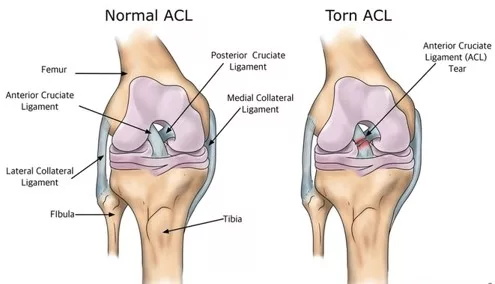The anterior cruciate ligament (ACL) is one of the primary stabilizing ligaments in the knee joint. It plays a crucial role in maintaining knee stability and preventing excessive forward movement of the tibia. Unfortunately, ACL injuries are common, particularly among athletes and active individuals, and they can significantly impact mobility and quality of life. Understanding ACL injuries, their treatment options, and the importance of expert care is essential for effective recovery.
What Is an Anterior Cruciate Ligament Injury?
An ACL injury occurs when the ligament is stretched, partially torn, or completely ruptured. These injuries are often the result of sudden stops, pivots, or awkward landings during activities like basketball, soccer, skiing, and tennis. Symptoms of an ACL injury include:
- A popping sound at the time of injury.
- Immediate pain and swelling.
- Difficulty walking or bearing weight.
- Knee instability or the feeling that the knee might “give out.”
Diagnosis and Severity of ACL Injuries
Prompt diagnosis is vital for managing ACL injuries. Common diagnostic tools include:
- Physical Examination: To check for knee stability and swelling.
- MRI Scans: To evaluate the extent of ligament damage.
- X-rays: To rule out associated fractures.
ACL injuries are classified into three grades:
- Grade 1: Mild stretching with no significant tearing.
- Grade 2: Partial tear, leading to some instability.
- Grade 3: Complete rupture, resulting in significant instability.
Treatment Options for ACL Injuries
Treatment for an ACL injury depends on its severity, the patient’s activity level, and overall health. The primary approaches include:
Non-Surgical Treatment
- Physical Therapy: Focuses on strengthening surrounding muscles to support the knee.
- Bracing: Provides stability during activities.
- Activity Modification: Avoiding activities that strain the ACL.
Non-surgical options are suitable for individuals with minor tears or low physical demands.
Surgical Treatment
- ACL Reconstruction: The damaged ligament is replaced with a graft from the patient’s own tissue or a donor.
- Arthroscopic Surgery: A minimally invasive technique that ensures faster recovery and minimal scarring.
Surgical intervention is typically recommended for complete ruptures, especially in active individuals or athletes.
Recovery Timeline
The recovery process following an ACL injury varies based on the treatment method:
- Non-Surgical Recovery: 3-6 months with consistent therapy.
- Surgical Recovery: Around 9-12 months, including physical therapy to restore strength and mobility.
Adherence to a structured rehabilitation program is key to regaining full function.
Why Choose The Cruciates for ACL Injury Treatment?
The Cruciates, led by the esteemed Dr. Nagendra Prasad, is a premier orthopedic and sports medicine team specializing in ACL injuries. Here’s why they stand out:
- Expertise: With years of experience in ligament surgeries, The Cruciates have a proven track record of successful outcomes.
- Advanced Technology: Utilizing cutting-edge techniques like arthroscopic surgery, they ensure precision and faster recovery.
- Personalized Care: Each treatment plan is tailored to the patient’s needs, ensuring optimal results.
- Comprehensive Rehabilitation: The team emphasizes post-surgical therapy to enhance recovery and prevent reinjury.
With a patient-first approach, The Cruciates are renowned for delivering world-class care and empowering patients to return to their active lifestyles.
Preventing ACL Injuries
While not all ACL injuries can be prevented, the following tips can reduce the risk:
- Strength Training: Focus on quadriceps, hamstrings, and core muscles.
- Proper Techniques: Learn safe jumping, landing, and pivoting techniques.
- Wearing Supportive Gear: Use braces or high-quality footwear during sports.
- Stretching and Warm-Ups: Prepare muscles before engaging in intense activities.
Surgical Treatment
- ACL Reconstruction: The damaged ligament is replaced with a graft from the patient’s own tissue or a donor.
- Arthroscopic Surgery: A minimally invasive technique that ensures faster recovery and minimal scarring.
Surgical intervention is typically recommended for complete ruptures, especially in active individuals or athletes.
Preventing ACL Injuries
While not all ACL injuries can be prevented, the following tips can reduce the risk:
- Strength Training: Focus on quadriceps, hamstrings, and core muscles.
- Proper Techniques: Learn safe jumping, landing, and pivoting techniques.
- Wearing Supportive Gear: Use braces or high-quality footwear during sports.
- Stretching and Warm-Ups: Prepare muscles before engaging in intense activities.
Conclusion
ACL injuries, though challenging, are manageable with timely intervention and expert care. Whether through non-surgical methods or advanced reconstructive techniques, restoring knee stability and mobility is achievable. The Cruciates, with their unparalleled expertise and patient-centered approach, are the trusted choice for ACL treatment, ensuring comprehensive care and lasting results.
Frequently Asked Questions About ACL Injuries
1. What is the most common cause of an ACL injury?
ACL injuries often result from sports-related activities involving sudden stops, pivots, or awkward landings, particularly in sports like soccer, basketball, and skiing.
2. Can an ACL tear heal on its own?
Partial tears may improve with physical therapy and rest, but complete ruptures usually require surgical intervention for full recovery.
3. How long does it take to recover from ACL surgery?
Recovery typically takes 9-12 months, depending on the severity of the injury and adherence to rehabilitation protocols.
4. Is ACL reconstruction surgery painful?
Pain management techniques and modern surgical methods minimize discomfort. Post-surgery pain can be effectively managed with medication and therapy.
5. Why should I choose The Cruciates for my ACL treatment?
The Cruciates offer expert care, advanced surgical techniques, and a personalized approach, ensuring successful recovery and a return to an active lifestyle.
also visit:
https://fantapa.com/2025/life-skills-for-students-the-foundation-for-a-bright-future/22763/



